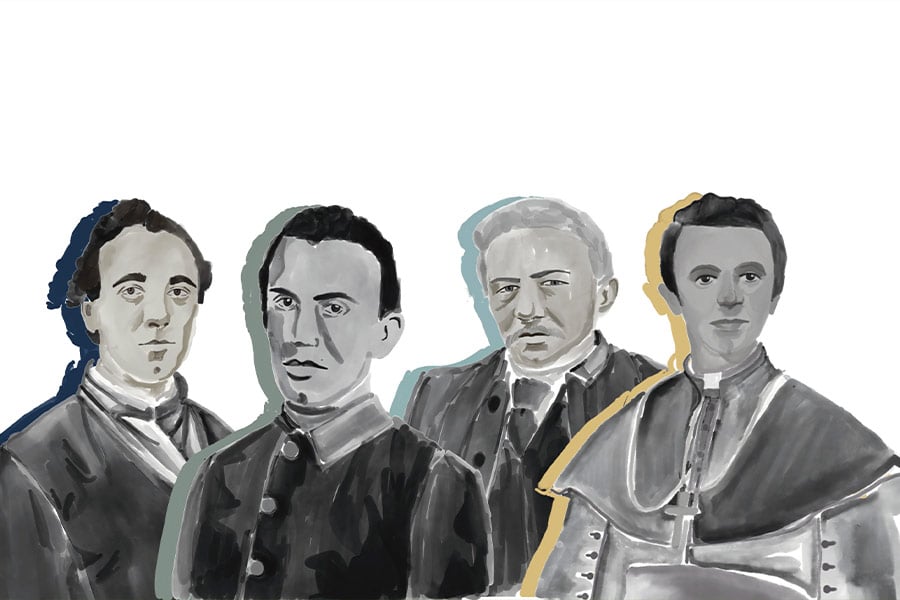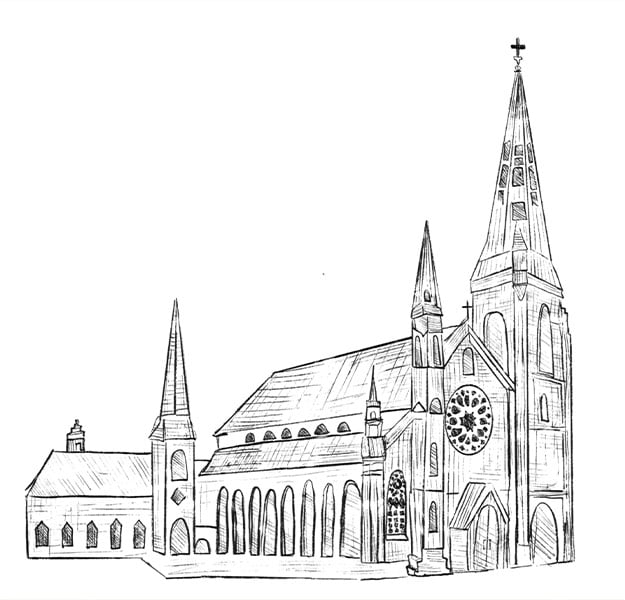“I was nothing; now I am a Catholic.” James Augustine Healy, America’s first Black bishop

(NTC/Maria Diaz)
In 1966, Pope St. Paul VI ordained Father Harold Perry auxiliary bishop of New Orleans. President Lyndon Johnson, along with religious and civil leaders across the nation, lauded the appointment of a Black bishop. Still, it was embarrassing to read news stories telling of protesting Catholics waiting outside the Cathedral of St. Louis greeting the newly consecrated bishop with scowls and a homemade sign reading “Jesus Did Not Choose Non-White Apostles.”
Weeks before, Archbishop Philip Hannan informed the press of Perry’s appointment, announcing, “We welcome the first American-born Negro bishop.” While he meant well, he was ill-informed.
The first Black bishop in the U.S. was appointed in 1875 and he did not meet the resistance Bishop Perry at first endured. The bishop was James Augustine Healy who, along with his brothers and sisters, achieved notable accomplishments and distinction.
According to the New England Historical Society, the bishop’s father, Michael Morris Healy of County Roscommon, Ireland, made his way to Georgia in 1820, winning a sizeable freehold near Macon in a land lottery, later acquiring a 1,500-acre cotton plantation, complete with forty-nine slaves.
Michael soon desired to marry Mary Eliza Clark, a woman of mixed race and a slave. Georgia’s miscegenation laws prevented the union. So, in 1830, Michael wed Mary Eliza while visiting Santo Domingo. They both died in 1850, nine of their ten children surviving infancy.
By law in Georgia, Michael’s wife and children were slaves. The same law also forbade educating them. So, Michael sold his plantation in 1837, taking his family to New York. There the children attended Quaker schools in Flushing, Long Island.
In 1840, Michael struck a friendship with the Most Reverend John Fitzpatrick, bishop of Boston, and acquainted the prelate with his life story and aspirations for his family. Through Bishop Fitzpatrick’s assistance, James, the eldest son, along with brothers Hugh, Patrick, and Sherwood, were admitted to newly founded Holy Cross Jesuit College in Worcester, Massachusetts.
Smitten by the beauty of the Catholic faith, during a student retreat the four brothers expressed their desire for Baptism. “What a change,” James confided to his diary. “I was nothing, now I am a Catholic.”
At Holy Cross the Healy brothers excelled at their studies. In the words of their biographer, James M. O’Toole, “Each brother was more brilliant than the one who came before him.” James became valedictorian of the college’s first graduating class in 1849.
Hugh later went into business but died in a freak boating accident at the age of 21.

Michael, the fifth son, went to sea at 16. Joining the Revenue Cutter Service — precursor of the Coast Guard — he was commissioned a third lieutenant by President Lincoln. In 1880, Michael — known to friends as “Hell Roaring Mike” — was placed in command of patrolling the northwest coast. For 20 years he was America’s only law enforcement officer for the immense Alaskan territory. A U.S. Coast Guard research icebreaker is named in his honor.
Eugene was only two when his parents died. He is the only family member who never quite found his role in life.
The three Healy daughters also joined the Church. Martha, the eldest, attended a school in Montreal staffed by sisters of the Congregation de Notre Dame. So impressed was she by their teaching Martha entered the order. She opted out after a few years, married an Irish immigrant, and settled down in Boston. Through her son and his descendants, the Healy line survives.
Amanda Josephine joined Martha in Montreal. She, too, chose the sisterhood but with the Religious Hospitallers of St. Joseph, a nursing order which pioneered such innovations as sterile operating theaters for patients.
Eliza accompanied her sisters in Montreal and also entered the Notre Dame Congregation. Here she found the opportunity to hone her teaching and administrative talents. Establishing schools in New York and Canada, Eliza was the first Black woman to become an abbess in the United States.
Patrick Francis was ordained a priest of the Jesuit order. The first African American to earn a doctorate degree, he was a popular and sought-after teacher. Named president of Georgetown University in 1874, Patrick modernized the curriculum and expanded the law and medical schools, all while supervising a mammoth building program. Georgetown remembers him as its second founder. The university’s Healy Hall is named for him.
Considered the most exceptional of the brothers, fluent in several languages, renowned for his expertise in theology and Gregorian chant, Anthony Sherwood was ordained a Jesuit after attaining his doctorate in canon law. At one time director of the seminary in Troy, NY, Sherwood was named rector of Holy Cross Cathedral in Boston. Sadly, this devout priest died in 1875 at the age of 39. More than 150 priests and several bishops attended his funeral.
All along, Bishop Fitzpatrick, the family’s good friend, kept an eye on the Healys, helping James and the rest of his family pass for white, the great family secret.

(NTC/Maria Diaz)
In 1849, the bishop sponsored James’ entry to the seminary in Montreal, sparing him the need to provide a copy of his parents’ marriage certificate identifying his mother as a former slave. James completed his priestly training in Paris, being ordained in the Cathedral of Notre Dame. Writing for Patheos, Pat McNamara noted:
In June 1854, James became America’s first Black priest, but this information was never made public. Boston priests knew and commented on it among themselves, but Bishop Fitzpatrick supported Healy, placing him in key administrative roles such as chancellor and his personal secretary. As James’ ability became evident, comments became fewer.
While working among Boston’s poor, Father Healy publicly opposed state anti-Catholic laws. In 1866 he was named pastor of St. James Church, Boston’s largest parish.
Blessed Pius IX named James Healy the second bishop of the pioneer diocese of Portland, in 1875. The first Black bishop ruled a diocese which included all of Maine and New Hampshire. The list of his achievements is impressive:
- Facing down residual nativist resentment of German and Irish Catholic immigrants, Bishop Healy supervised a doubling of the Catholic population. This growth led to New Hampshire becoming its own diocese in 1885;
- A tireless advocate for Civil War widows and orphans, the bishop established a vacation camp for children of veterans on a small island near Portland;
- More than 60 new parishes, 18 schools, 18 convents, 18 welfare stations, and a girls junior college were established;
- Vocations to the priesthood grew significantly;
- Recognizing his efforts to ease the plight of Native Americans, Bishop Healy was named a consultant to the U.S. Bureau of Indian Affairs.
- Attending the Third Plenary Council of Baltimore in 1884, he supported the need for an American catechism to aid conversion and help make Catholic teaching better known to the laity, especially children;
- In 1900, his 25th anniversary as bishop, James Healy was named Assistant to the Papal Throne, then a position which often led to the cardinalate.
Two months after this appointment, Bishop Healy died of a heart attack at the age of 70.
During the past 70 years a truly fraternal unity has been shown by a multitude of Black priests and bishops ministering among all Catholics, intent on preaching the peace of Jesus Christ. Their success is highlighted by the recent appointment of Archbishop Wilton Gregory to the Sacred College of Cardinals. Let us thank God, the Father of all, for their witness and determination to boldly proclaim the Gospel. Let us continue praying that the need for “passing as white,” in ministry and elsewhere, is transcended in our nation. And let us continue praying that we, as Catholics, open wide our hearts to the truth that we are all brothers and sisters equally made in the image of God.
